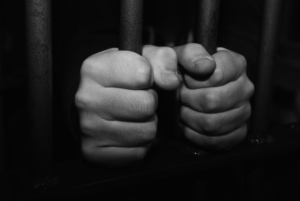 It is not certain where John Thompson was one fateful night in December 1984, but one thing is clear: He was not robbing three children in Orleans Parish, Louisiana. Thompson’s innocence did not prevent the District Attorney’s Office in Orleans Parish from building a case against him for the robbery, or from failing to turn over blood evidence to the defense—a failure that would taint his ability to accurately defend himself against charges of robbery and murder.
It is not certain where John Thompson was one fateful night in December 1984, but one thing is clear: He was not robbing three children in Orleans Parish, Louisiana. Thompson’s innocence did not prevent the District Attorney’s Office in Orleans Parish from building a case against him for the robbery, or from failing to turn over blood evidence to the defense—a failure that would taint his ability to accurately defend himself against charges of robbery and murder.
The District Attorney’s Office, headed by Harry Connick, Sr., tried and ultimately convicted Thompson of first-degree murder. As Thompson was found guilty of robbery first, he was not allowed to testify in his own defense at his murder trial, since the robbery conviction “tainted his credibility.”
Thompson then sat on death row for 14 years, until 1999, when an investigator discovered the blood evidence that Connick’s office failed to submit to Thompson’s attorney during the robbery trial. The blood in question was type B. Thompson’s blood is type O. In light of the new evidence, a Louisiana court exonerated Thompson of the robbery charge and reversed Thompson’s murder conviction, since the robbery conviction had prevented Thompson from testifying in his own defense at his murder trial.
After his release, Thompson promptly filed a lawsuit against Connick’s office for $14 million, which a jury eventually awarded him. The jury’s decision was upheld in Federal District Court before Connick appealed to the Supreme Court to reverse the jury’s decision. In a 5-4 decision, the highest court in the land sided with Connick, and denied Thompson his $14 million award.
The issue placed before the Supreme Court was not Thompson’s guilt or innocence, but whether or not Connick’s office deliberately ignored the decision in Maryland v. Brady, which holds that prosecutors must turn over favorable evidence to the defense. If the blood evidence in Thompson’s robbery trial had been revealed, he would not have been convicted; if Thompson was innocent of the robbery crime, he would have been permitted to testify at his murder trial.
The Supreme Court ruled that this one incident of failing to turn over evidence does not prove a pattern of deliberate indifference to the Brady decision, and therefore the District Attorney’s Office should not be held culpable in the abuses Thompson suffered. It is worth noting that four of the Supreme Court justices disagreed with the majority ruling. The dissent highlighted that Connick’s office is one of the worst in America in terms of failing to turn over favorable evidence to defense teams.
Although Supreme Court decisions often seem like mere matters for the law books, this decision has significant implications for defendants across the country. Most importantly, the Thomspon decision implies that failure to turn over evidence may remain unpunished by the courts, even though one piece of evidence can mean life and death for a defendant.

